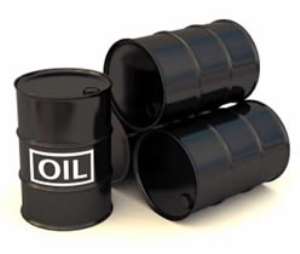
PARLIAMENT HAS, by majority decision, okayed the collateralisation of the nation's emerging oil resource, satisfying the desire of the ruling National Democratic Congress (NDC) to use petroleum revenue as collateral to contract loans.
After shouts of 'sit down' and animated debates from both sides of the House over the collateralisation on floor of parliament yesterday, the First Deputy Speaker, Edward Doe Ahjaho directed that a head count be taken.
The majority NDC, which was in favour of the collateralization, obtained 97 votes whiles the Minority, after stiff opposition, got 87, giving government the green light to use future revenues from oil as collateral in accessing loans.
The decision by Parliament has gone against a nationwide survey in which 83 percent of Ghanaians were not in favour of the collateralisation.
Samia Nkrumah, the lone MP representing the Conventions Peoples Party (CPP), abstained.
Clause 5 of the Petroleum Revenue Management Bill, which the governing NDC approved, 'Prohibits the use of the Petroleum Holding Fund for the provision of credit to government, public agencies, and private sector entities or any other person or entity and as collateral for debts, guarantees, commitments or other liabilities of any other entities.'
However, NDC MP for Nabdam and Chairman of the Parliamentary Select Committee on Mines and Energy, Moses Asaga, amended the clause to allow for collateralisation, generating heated debates from the two leading political parties.
With the amendment carried, 70 percent of the oil revenue can now be used as collateral, while the remaining 30 percent goes to a proposed Heritage Fund and Stabilisation Fund captured in the Petroleum Revenue Management Bill.
The Minority NPP had vehemently opposed the wholesale collateralization of Ghana's future oil revenue because of what it described as inherent dangers in allowing the nation's oil resources to be used as collateral for loans, particularly when oil is a finite commodity.
According to the Minority, led by Osei Kyei-Mensah-Bonsu, if government was allowed to collateralize the oil revenue, there would be indiscriminate borrowing which could create problems for the economy in the future.
Collateralizing the oil revenue, the Minority explained, was not a prudent measure since Ghana's credit rating had gone high internationally and could attract any amount of loan for development.
Dr. Anthony Akoto Osei, former Minister of State at the Ministry Finance and Economic Planning, cautioned the ruling NDC to be guided by the experiences elsewhere, citing Angola, Nigeria and Venezuela, which suffered adversely due to the collateralisation of oil.
But Haruna Bayirga and Dominic Azuma, MPs for Sissala West and Garu/Tempane respectively, suggested that anybody who was against the collateralisation was against the development of the country, upsetting the Minority side who thought the comment was unfair.
By Awudu Mahama




 Saglemi Housing Project will not be left to rot – Kojo Oppong Nkrumah
Saglemi Housing Project will not be left to rot – Kojo Oppong Nkrumah
 Transport fares hike: GPRTU issue two-day ultimatum
Transport fares hike: GPRTU issue two-day ultimatum
 ARC endorses Alan as presidential candidate – Buaben Asamoa
ARC endorses Alan as presidential candidate – Buaben Asamoa
 Akufo-Addo appoints Kwasi Agyei as new Controller and Accountant-General
Akufo-Addo appoints Kwasi Agyei as new Controller and Accountant-General
 PNC dismiss reports of mass resignations
PNC dismiss reports of mass resignations
 PAC advocates for revenue collectors to be engaged on commission basis, not full...
PAC advocates for revenue collectors to be engaged on commission basis, not full...
 Genser Energy commissions 110km of natural gas pipeline at Anwomaso
Genser Energy commissions 110km of natural gas pipeline at Anwomaso
 Naa Torshie calls for tolerance, peace ahead of 2024 election
Naa Torshie calls for tolerance, peace ahead of 2024 election
 Asantehene commends Matthew Opoku Prempeh for conceiving GENSER Kumasi Pipeline ...
Asantehene commends Matthew Opoku Prempeh for conceiving GENSER Kumasi Pipeline ...
 Let’s do away with ‘slash and burn politics’ in Ghana — Dr Adutwum
Let’s do away with ‘slash and burn politics’ in Ghana — Dr Adutwum
